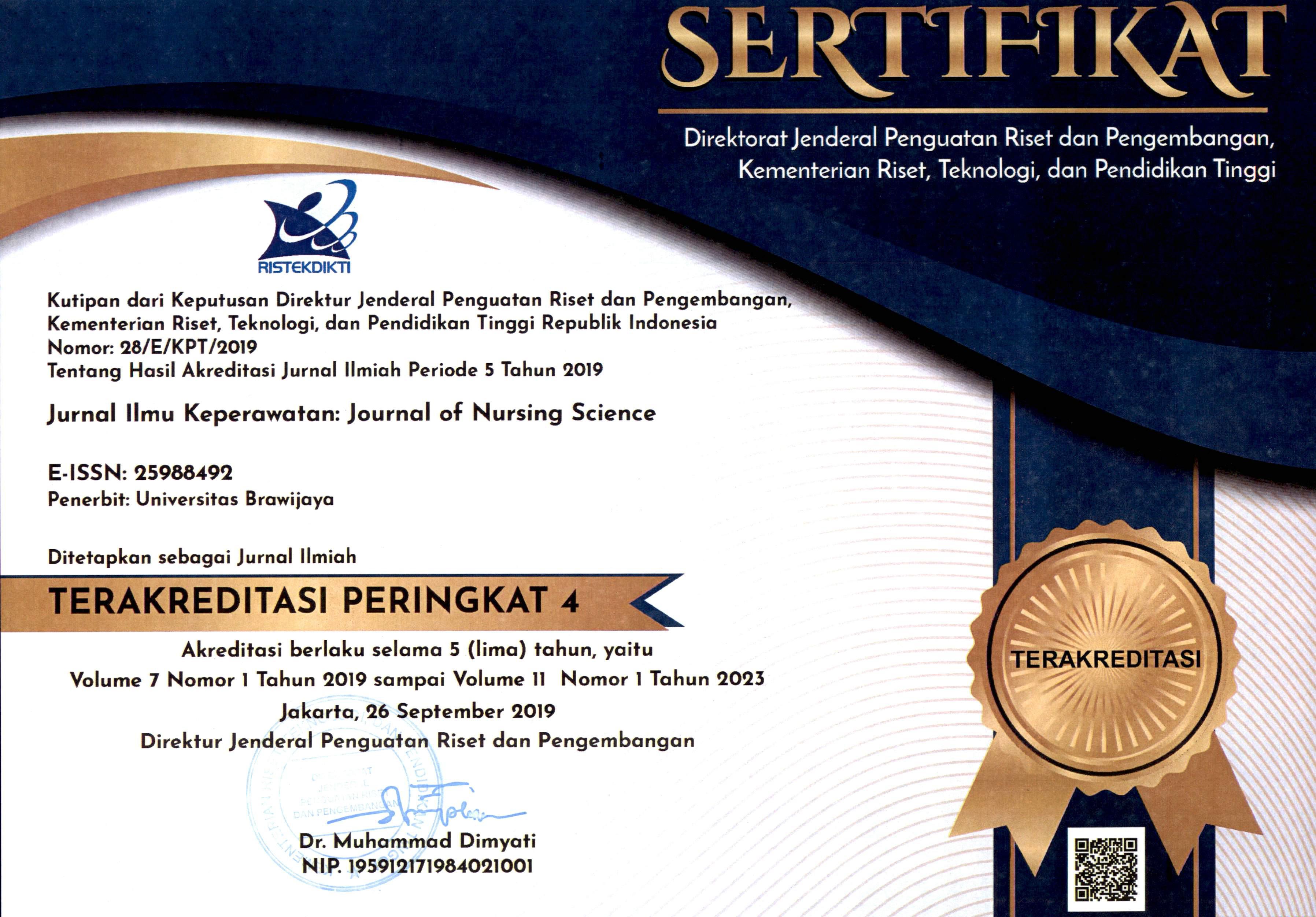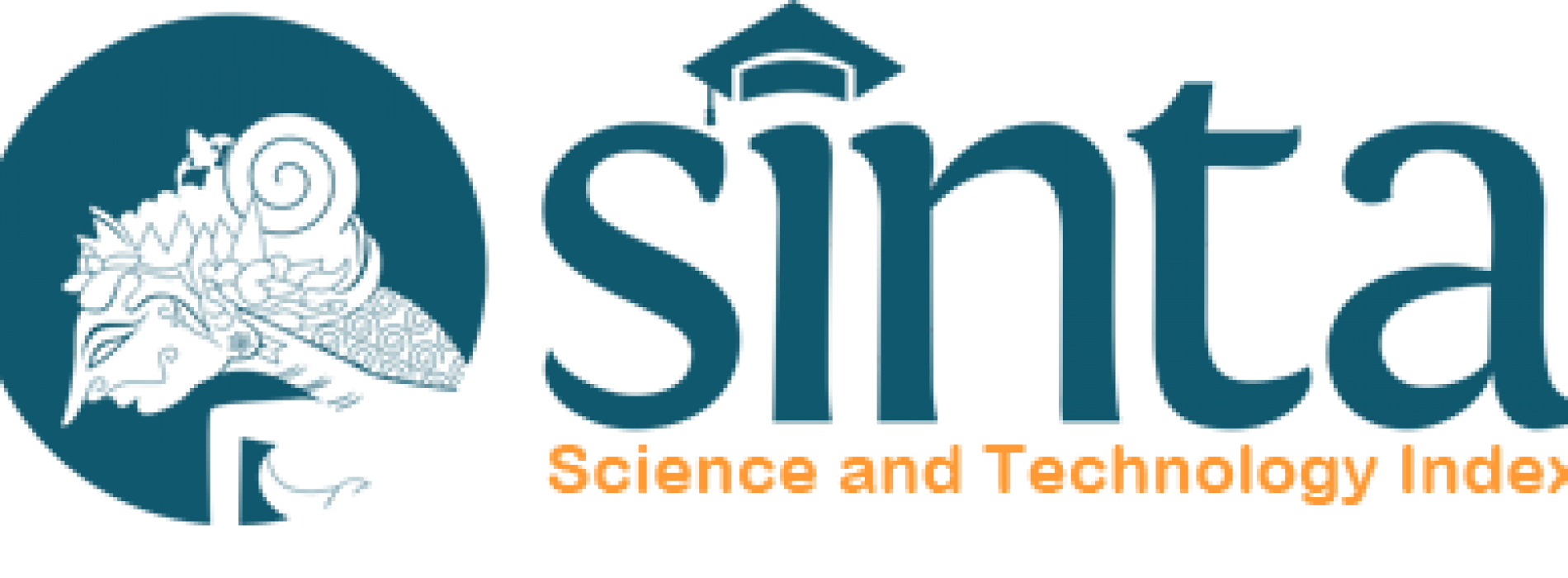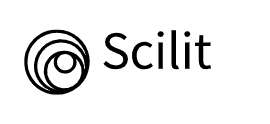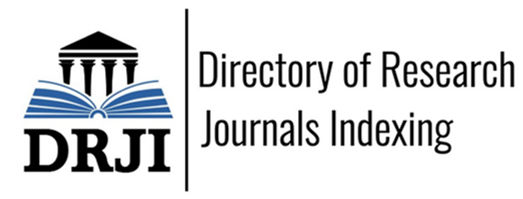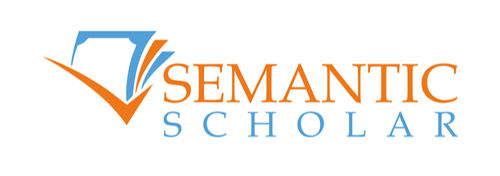DESCRIPTION OF KNOWLEDGE, ATTITUDE, AND BEHAVIORAL BREASTFEEDING ON WORKING MOTHER IN THE ARJASA COMMUNITY HEALTH CENTER WORKING AREA IN JEMBER REGENCY
DOI:
https://doi.org/10.21776/ub.jik.2020.008.01.1Keywords:
Exclusive Breastfeeding, Knowledge, Attitude, Working MothersAbstract
Exclusive breastfeeding is an effective way to prevent child mortality. One of the factors that become an obstacle in exclusive breastfeeding is the status of the mother who works, which affects the mother to give exclusive breastfeeding, especially if the mother doesn’t know about exclusive breastfeeding. The purpose of this study was to find out how the description of knowledge, attitudes, and behavior of exclusive breastfeeding on working mothers in the Arjasa Community Health Center Working Area in Jember
Regency. This type of research is descriptive with a cross-sectional approach and use a purposive sampling technique. Data collection was finished using a questionnaire. Univariate analysis was used to determine the frequency and percentage of each subvariable. The results showed that 3% of working mothers have less knowledge, 3% have enough knowledge, and 61% have good knowledge. 16% of working mothers have enough attitude, 51% have a good attitude. Working mothers who gave exclusive breastfeeding as much as 40% and did not give exclusive breastfeeding as much as 27% of the total of respondents. Knowledge and attitudes towards exclusive breastfeeding can
support mothers to give exclusive breastfeeding. Knowledge and attitude are not the only factors that influence exclusive breastfeeding, in this region the status of the work plays a greater role. Works can not be used as an excuse for the mother not to give exclusive breastfeeding. The rights and welfare of the mother have been guaranteed and protected by the Health Law and Labor Law
References
- Abdullah, G. (2012). Determinan Pemberian ASI Eksklusif pada Ibu Bekerja di Kemenkes Kesehatan RI. Skripsi, Fakultas Ilmu Kesehatan Masyarakat, Universitas Indonesia AsDi, IDAI dan PERSAGI. (2017). Penuntun Diet Anak. Jakarta: Fakultas Kedokteran Universitas Indonesia
- Aimi-ASI. (2013). Orang Tua Bekerja pun bisa sukses memberi ASI Ekslusif. https://aimi-asi.org/layanan/lihat/orang-tua-bekerja-pun-bisa-sukses-memberi-asi-eksklusif
- Badan Pusat Statistiik. (2018). Kecamatan Arjasa dalam Angka 2018. Jember: Badan Pusat Statistik
- Badan Pusat Statistik Kabupaten Jember , 2017. Statistik Indonesia Tahun 2010. Jakarta Pusat : Badan Pusat Statistik
- Badan Pusat Statistik. (2018). Kabupaten Jember dalam Angka 2018. Jember: Badan Pusat Statistik
- Bahriyah, F., Putri, M., & Jaelani, A. K. (2017). Hubungan Pekerjaan Ibu terhadap Pemberian ASI Eksklusif pada Bayi. Journal Endurance, 2(2), 113–118.
- Bakti, Imam. (2016). Hubungan Status Pekerjaan, Pendidikan Formal, dan Pengetahuan Ibu dengan Pemberian ASI Eksklusif pada Balita di Posyandu Lestari, Kelurahan Kumpulrejo Kec.Argomulyo, Salatiga. Skripsi. Surakarta: Fakultas Ilmu Kesehatan Universitas Muhammadiyah Surakarta
- Balitbang Kemenkes RI. 2013. Riset Kesehatan Dasar; RISKESDAS. Jakarta: Balitbang Kemenkes RI
- Dinas Kesehatan Jember (2017). Profil Kesehatan Jember Tahun 2017. Jember: Dinas Kesehatan.
- Firmansyah, N., Mahmudah.(2012). Pengaruh Karakteristik (Pendidikan, Pekerjaan), Pengetahuan Dan Sikap Ibu Menyusui Terhadap Pemberian Asi Eksklusif Di Kabupaten Tuban. Jurnal Biometrika dan Kependudukan. Vol. 1: 62-71
- IDAI. (2008). Bedah ASI. Jakarta: Balai Penerbit FKUI
- Ilhami, Muhammad Fadhil. (2015). Hubungan Tingkat Pengetahuan Ibu Tentang ASI Eksklusif dengan Tindakan Pemberian ASI Eksklusif di Puskesmas Kartasura. Skripsi. Surakarta: Fakultas Kedokteran Universitas Muhammadiyah Surakarta
- Intami, E., Zaman, C., & Kesuma, R. (2018). Analisis faktor yang mempengaruhi pemberian asi eksklusif pada ibu bekerja di sekolah dasar kabupaten banyuasin tahun 2016, 7(01), 86–98.
- Kemenkes RI. (2015). Mari Dukung! Menyusui dan Bekerja. Mari Dukung! Menyusui Dan Bekerja.
- Kementerian Kesehatan RI. (2014). Situasi dan Analisis ASI Ekslusif. Jakarta: Infodatin
- Kurniawan, B. (2013). Determinants of the Successful of Exclusive Breast Feeding. Medical Journal of Brawijaya, 27(4), 236.
- Mekuria, G., & Edris, M. (2015). Exclusive breastfeeding and associated factors among mothers in Debre Markos, Northwest Ethiopia: a cross-sectional study. International breastfeeding journal, 10(1), 1. doi:10.1186/s13006-014-0027-0
- Ogunlesi TA. (2009). Maternal socio-demographic factors influencing the initiation and exclusivity of breastfeeding in a Nigerian semi-urban setting. Matern Child Health J. 2010;14(3):459–465. doi: 10.1007/s10995-008-0440-3
- Rahman, N., Dewi, N. U., Fitrasyah, S. I., Bohari, Oktaviani, V., & Rifai, M. (2017). Factors related to exclusive breastfeeding among mothers in the City of Palu, Central Sulawesi, Indonesia. Malaysian Journal of Nutrition, 23(2), 175–189.
- Septiani, Hanulan dkk. (2017). Faktor-faktor yang berhubungan dengan Pemberian ASI Ekslusif Oleh Ibu Menyusui yang Bekerja sebagai Tenaga Kesehatan, Jurnal Ilmu Kesehatan 2(2), 159-174
- Sulistiyowati, dan Pulung Siswantara. (2014). Perilaku Ibu Bekerja dalam memberikan ASI Eksklusif di Kelurahan Japanan Wilayah Kerja Puskesmas Kemlagi Mojokerto, Jurnal Promkes 2(1), 89-100
- Tsai. (2013). Impact of a Breastfeeding-Friendly Workplace on an Employed Mother’s Intention to Continue Breastfeeding After Returning to Work. Breastfeeding Medicine Journal 8(2)
- WHO / UNICEF. breastfeeding and young child feeding courses. (n.d.), 61.
Downloads
Published
How to Cite
License
Authors published in this journal agree to the following terms:
1. The copyright of the received article shall be assigned to the journal as the publisher of the journal. The intended copyright includes the right to publish the article in various forms (including reprints). The journal maintains the publishing rights to the published articles.
2. Authors may enter into separate additional contractual agreements for the non-exclusive distribution of the published journal version of the work (for example, posting it to an institutional repository or publishing it in a book), with acknowledgment of their initial publication in this journal.
3. Authors are permitted and encouraged to post their work online (e.g. in an Institutional Repository or on their website) before and during the submission process, as this can result in a productive exchange, as well as earlier and larger citations of the published work.
4. Articles and all related material published are distributed under Creative Commons Attribution-NonCommercial 4.0 International License or CC BY-NC 4.0 license.
JNSU is licensed under a Creative Commons Attribution-NonCommercial 4.0 International License or CC BY-NC 4.0 license.
Most read articles by the same author(s)
- Rhozy Sadya Mangrasih, Dini Kurniawati, Peni Perdani Juliningsih, THE EFFECT OF FOOT SOAK THERAPY USING WARM WATER TOWARD ANXIETY LEVEL OF PREECLAMPSIA MOTHERS IN PUBLIC HEALTH OF TEMPUREJO JEMBER REGENCY , Journal of Nursing Science Update (JNSU): Vol. 8 No. 1 (2020)
- Desi Trisari, Dini Kurniawati, Peni Perdani, CORRELATION BETWEEN PREGNANT PHYSICAL ACTIVITY WITH PREECLAMPSIA IN WORKING AREA OF TEMPUREJO PUBLIC HEALTH CENTER, JEMBER , Journal of Nursing Science Update (JNSU): Vol. 7 No. 2 (2019)
- Lidya Amal Huda, Dini Kurniawati, Peni Perdani Juliningrum, THE RELATIONSHIP FAMILY EMOTIONAL SUPPORT WITH ANXIETY OF PREECLAMPSIA PREGNANT MOTHER , Journal of Nursing Science Update (JNSU): Vol. 8 No. 2 (2020)
- Dini Kurniawati, Iis Rahmawati, Wan Sandra Clarista, The Effect of Bibliotherapy on Teenagers' HIV/AIDS Knowledge in the Puger Work Area Community-Based Health Centers, Jember Regency , Journal of Nursing Science Update (JNSU): Vol. 10 No. 2 (2022): November



